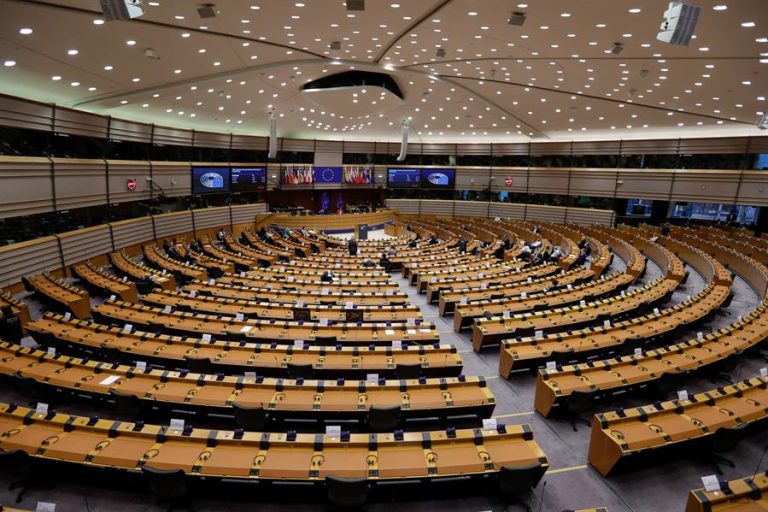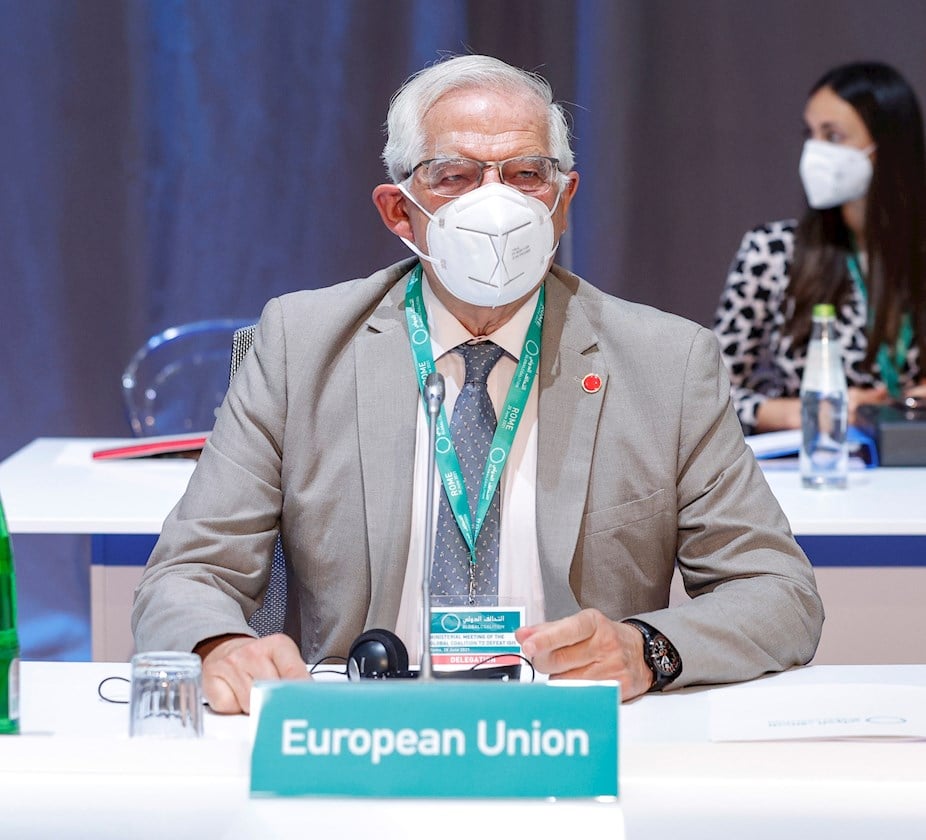10 de julio 2021

The Return of the Military

PUBLICIDAD 1M
PUBLICIDAD 4D
PUBLICIDAD 5D
European deputies call on the European Union to broaden sanctions against the presidential couple and their inner circle

European deputies call on the European Union to broaden sanctions against the presidential couple and their inner circle.
On Thursday, July 8, the European Parliament approved a resolution on the situation in Nicaragua. Among the 16 points in the document, the Parliament called on the Financial Action Task Force to “ensure international financial security in the face of illicit operations originating from the Ortega-Murillo regime and its collaborators.”
The resolution was overwhelmingly approved, with 629 votes in favor, 19 opposed and 40 abstentions. Six hundred eighty-eight of the 705 Parliament deputies were present.
In the document, the European deputies once again demanded that the European Union expand the list of individuals and entities to be sanctioned, in order to target human rights violators in Nicaragua. The list of recommendations included President Daniel Ortega, vice president and first lady Rosario Murillo and their “inner circle”.
Item number 10 of the resolution: “calls on the Financial Action Task Force (FATF) to establish the necessary coordination with the US Office of Foreign Assets Control to ensure international financial security in the face of illicit operations originating from the Ortega-Murillo regime and its collaborators and their commercial relations and assets in European countries.”
This marks the first time that a resolution from this European body took aim at the regime’s sources of funding, although, since 2018, the European deputies have approved four resolutions regarding the Nicaraguan situation.
Before the voting took place, European deputy Soraya Rodriguez Ramos appeared in an interview on the Nicaraguan online news program Esta Noche. She explained: “We need to adopt conclusive measures that really identify and immobilize [the regime’s] foreign financial assets. The investigations should establish very clearly how personal and family business is being carried out, and if it’s being done using funds from the Nicaraguan budget.”
“It appears that [Ortega-Murillo] want to convert the country into a family business,” the Spanish European deputy asserted. Soraya Rodriguez is a member of the “Renew Europe” parliamentary group and spokesperson for the parliament’s Human Rights Sub-commission.
During plenary session debate in the European parliament on Tuesday, July 6, Rodriguez commented: “Ortega says he’s accustomed to being called all kinds of things. But I believe that – like all dictators – he’s not accustomed to have us dismantle the tangle of corruption that sustains his authoritarian regime.”
The call for a financial investigation noted that “Nicaragua has been blacklisted by the Financial Action Task Force since October 2020”.
The Financial Action Task Force (FATF) was created in 1989 by the Group of Eight, the eight most developed countries, to develop policies that help combat money laundering and the financing of terrorism and weapons of mass destruction.
In Item 11, the Parliament “Calls on the Council and the Member States to swiftly expand the list of individuals and entities to be sanctioned, including the President and Vice-President of Nicaragua and their inner circle”
In a resolution passed in October 2020, the European Parliament had already asked the Council to broaden sanctions against regime officials, including Ortega and Murillo.
On May 4, 2020, the European body sanctioned six high officials of the Ortega regime. Among them were four heads of police: National Police Commissioner Francisco Diaz; and Commissioners Luis Alberto Pérez Olivas, Justo Pastor Urbina and Ramon Avellan. They also sanctioned presidential advisor Nestor Moncada Lau and former health minister Sonia Castro.
Josep Borrell, the European Union’s high representative for foreign affairs and security policy participated actively in Tuesday’s debate. He advised: “in the next few days, we’ll propose to the [European] Council the adoption of restrictive measures in the style of those already taken in the past.”
Before the EU can impose sanctions, first Borrell must present a proposal. This is then analyzed in different bodies within each of the 27 member countries and within the European Council. Later, it goes on to the countries’ Foreign Ministers, who have the final vote. The Ministers must approve it unanimously.

Josep Borrell, the European Union’s high representative for foreign affairs. Photo: EFE
Borrell warned: “The situation (in Nicaragua) has reached such an extreme that, without a doubt, the member States will have to study more concrete actions, beyond just saying: “Enough now Mr. Ortega”. The situation merits it.”
In the last five weeks, the Ortega regime has jailed 26 opposition leaders, among them presidential candidates, activists, journalists and former guerrilla leaders.
The latest arbitrary detentions took place the night of July 5, when Ortega’s Police arrested presidential candidate Medardo Mairena, as well as farm movement leaders Pedro Mena and Freddy Navas. Also abducted and jailed were university student leaders Lesther Aleman and Max Jerez.
In the current resolution, the European Parliament “expresses its solidarity with the Nicaraguan population and strongly condemns all the repressive actions of the Nicaraguan authorities against democratic opposition parties and their members, journalists and other media workers, students, indigenous people, human rights defenders and civil society, as well as their family members.”
In extending the sanctions, the European deputies specifically noted the need to “take care not to harm the Nicaraguan people.”
At the same time, they stressed: “the need to maintain and ensure that EU assistance for civil society organizations, human rights defenders and the people of Nicaragua through the EU’s development and humanitarian programs, among others, reaches its true beneficiaries and not the government and authorities, in order to alleviate the impact of COVID-19 and the current governmental repression and prevent this crisis from turning into a humanitarian crisis.”
Item 11 of the resolution adds: “[We] recalls that, in the light of the Association Agreement between the EU and Central America, Nicaragua must respect and consolidate the principles of the rule of law, democracy and human rights, and reiterates its demand that, in the light of the current circumstances, the democratic clause of the Association Agreement be triggered.”
The resolution also spoke of the upcoming Nicaraguan elections, warning: “In order for the elections and the resultant government to be recognized by the European Parliament, the changes requested by the OAS and international organizations must be implemented, in particular the re-establishment of the rights and freedoms that make possible a free, credible and equitable electoral process.”
The same item urged President Ortega to “immediately” modify the Electoral Law to conform to the international parameters demanded by the Organization of American States. They also urge the Nicaraguan strongman to “appoint impartial people to the different electoral structures”, and to “restore the legal status of the parties that were stripped of it” [the Democratic Restoration Party and the Conservative Party].
Further, is called on the government to “guarantee the unrestricted presence of national and international electoral observation bodies while committing to political coexistence after the elections.”
Last December, the EU refused to recognize the results of Venezuela’s legislative elections, considering that they were neither “free, fair nor democratic” and that the vote count “didn’t represent the will of the Venezuelan people,” Josep Borrell stated at the time.
This article was originally published in Spanish in Confidencial and translated by Havana Times
Archivado como:
PUBLICIDAD 3M
Confidencial es un diario digital nicaragüense, de formato multimedia, fundado por Carlos F. Chamorro en junio de 1996.
PUBLICIDAD 3D